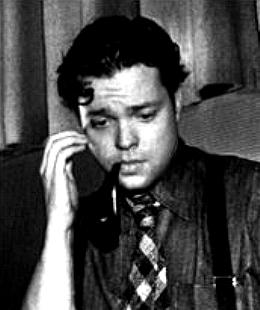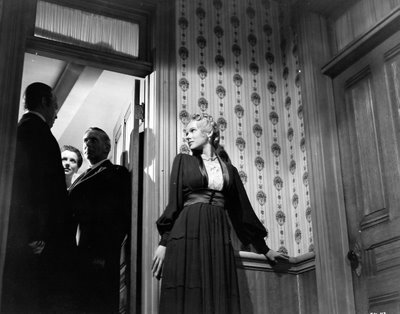 I'm not sure when I first saw Citizen Kane (1941), much less when I was impressed with it--or it was impressed upon me that it was The Greatest Film of All Time. That's the kind of thing you have to grow into--unless you just accept it, then move on. After all these years, I'm sometimes still not sure what kind of movie-goer I am--or, perhaps more honestly, the kind I'm willing to admit being. I often find myself following one crowd or another--often a crowd of one, usually a good friend who conveys a film's worth (or lack thereof) to me with just enough strength to tip me over--and that aint sayin' much. I'm all-too-willing to fall in love with a movie--and also eager to doubt my judgment and fall out of love. This happens all the time; for instance, a part of me mistrusted the Star Wars movies even way back in 1977, after a friend from my high school days refused to see it because of the instant hype surrounding its release. By then I'd waited in 'round-the-block lines at least three times; but ever since--and all too soon--I saw the marketing assault as a lessening of the films' power--OK, so did just about everybody else who wasn't a Lucas-geek. But for me, turning a blind eye kept the movies fresh and shining. Of course, my friend was right; still, my open heart always wants to love those movies, despite all odds: If you really want to be irritated, I can give you my pro-Jar Jar Binks speech. (It's weak, but the argument is based on a curt, comparative study involving certain other Star Wars characters. One word: Ewoks.)
I'm not sure when I first saw Citizen Kane (1941), much less when I was impressed with it--or it was impressed upon me that it was The Greatest Film of All Time. That's the kind of thing you have to grow into--unless you just accept it, then move on. After all these years, I'm sometimes still not sure what kind of movie-goer I am--or, perhaps more honestly, the kind I'm willing to admit being. I often find myself following one crowd or another--often a crowd of one, usually a good friend who conveys a film's worth (or lack thereof) to me with just enough strength to tip me over--and that aint sayin' much. I'm all-too-willing to fall in love with a movie--and also eager to doubt my judgment and fall out of love. This happens all the time; for instance, a part of me mistrusted the Star Wars movies even way back in 1977, after a friend from my high school days refused to see it because of the instant hype surrounding its release. By then I'd waited in 'round-the-block lines at least three times; but ever since--and all too soon--I saw the marketing assault as a lessening of the films' power--OK, so did just about everybody else who wasn't a Lucas-geek. But for me, turning a blind eye kept the movies fresh and shining. Of course, my friend was right; still, my open heart always wants to love those movies, despite all odds: If you really want to be irritated, I can give you my pro-Jar Jar Binks speech. (It's weak, but the argument is based on a curt, comparative study involving certain other Star Wars characters. One word: Ewoks.)So perhaps I only want Welles' "masterpiece" to be one; maybe it is merely an idea in my head, implanted by a half-century of Sight and Sound magazine polls, American Film Institute lists, the awestruck paeans delivered by friends. What a relief that would be: At long last I could stop watching the cursed thing, falling into it like a sudden chasm every time, dizzied by its technique and structure, of course, but more so by its deeply lonely heart. That is where Citizen Kane rests, not as a testament to the wunderkind's audacious, dazzling sensibility--which it is, of course--nor a landmark, the American cinematic Huckleberry Finn, along whose banks every filmmaker must loiter, watching and learning--which they must. No, the film's lasting strength is the way the formal elements of the film wait upon that loneliness like wise virgins, watchful of the sorrow Welles wrings from that monster Kane, trimming their wicks as the night deepens and the moment approaches.
 And that moment is the breathless shock of Rosebud--and not on his deathbed, but when Kane stands in the ruined bedroom, Susan gone. He absent-mindedly holds the snow globe, realizes it's in his hand, and looks at it, stunned, his face like a strange bladder filled to almost-bursting with bile and loss, and mutters That Word. And we realize that it isn't a little thing, but, as Jed Leland suggested, "something he lost"--or worse yet, something he never had: Watch Agnes Moorehead as his mother, her face mingling sacrificial love and grim denial. "Rosebud" is only partially the lost mother; more than that, it is the lack of one, the orphan's lament. Susan asks Kane if he's a magician--as often noted, what a Wellesian appellation that is--as he fumbles with shadow-figures; but he is not; instead, he's the rube, conned and empty-handed as the snow globe tumbles and shatters--as it has from the very beginning.
And that moment is the breathless shock of Rosebud--and not on his deathbed, but when Kane stands in the ruined bedroom, Susan gone. He absent-mindedly holds the snow globe, realizes it's in his hand, and looks at it, stunned, his face like a strange bladder filled to almost-bursting with bile and loss, and mutters That Word. And we realize that it isn't a little thing, but, as Jed Leland suggested, "something he lost"--or worse yet, something he never had: Watch Agnes Moorehead as his mother, her face mingling sacrificial love and grim denial. "Rosebud" is only partially the lost mother; more than that, it is the lack of one, the orphan's lament. Susan asks Kane if he's a magician--as often noted, what a Wellesian appellation that is--as he fumbles with shadow-figures; but he is not; instead, he's the rube, conned and empty-handed as the snow globe tumbles and shatters--as it has from the very beginning. I don't think anyone talked me into this lonely place--unless you count Welles, of course. I think, for once, I found a film that has learned to speak to me without mediation. Those are the movies I most seek out, impervious to my own vacillating judgment. And since Citizen Kane seems best able to do this of (practically) any other movie I've seen, I suppose I can continue to allow it its greatness, at least as long as I can bear to watch it.

No comments:
Post a Comment